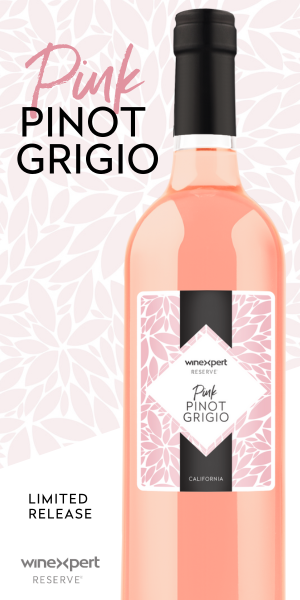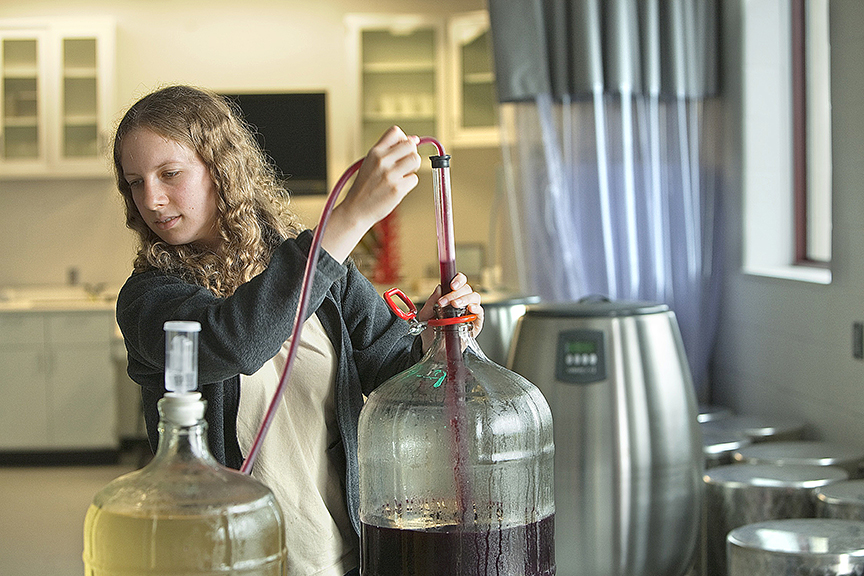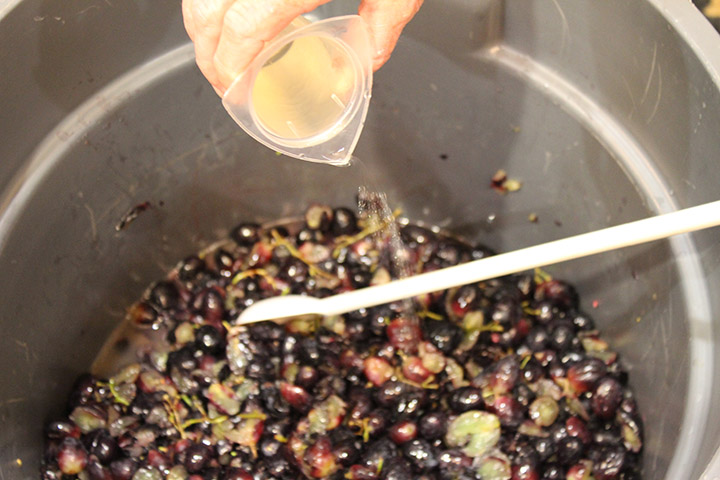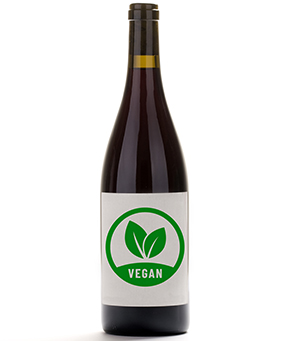Using Enzymes in Country Wines
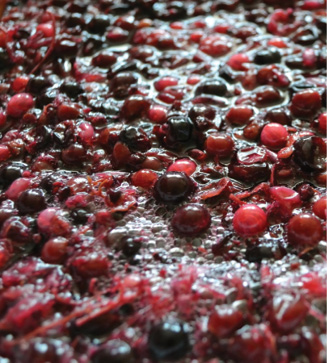
Beyond basic pectic enzymes to increase juice yield and improve clarity, I have not seen much mention of enzyme use in country fruit wines. To be sure, most of the commercial enzyme preparations available to the home winemaker are isolated and purified for use in grape wine. That does not mean, however, that they will not find excellent applications in wines made from other fruits and herbs.
Enzymes are essential actors in biological systems. In biochemical reactions where the outcome is favored by an energy state, but inhibited by other factors, enzymes serve as catalysts to facilitate and speed up the process. Enzyme actions are usually quite specific, with the enzyme acting on a particular bond in one or a few related substrates. Enzymes are named with an –ase ending, with the main root of the name indicating the substrate the enzyme acts upon. Pectinase breaks down pectins, lipase breaks down lipids (fatty acids), and so forth. Some have very specific names because they act on only one organic molecule, while others may be named generally after an entire class of substrates.
The reactions that occur in fruit ripening, maceration, and alcoholic fermentation are facilitated by enzymes. Because the enzyme action takes place naturally in the production of wine, other food-grade enzyme products are widely approved by the TTB (Tax and Trade Bureau) of the BATF (Bureau of Alcohol, Tobacco, and Firearms) for addition to fermentations. All of the products I have seen for sale are non-GMO (not produced with genetically modified organisms). Often extracted from cultures of Aspergillus niger fungus grown under laboratory conditions.
While mostly not packed in convenient small sizes for home country winemakers, some enzymes are repackaged into consumer quantities by home winemaking shops. Alternatively, you may be able to purchase a larger commercial package and share it among friends or at your local home winemaking club. If resealed and kept in a cool, dark place, the powdered enzyme preparations should be useful for at least two years. Liquid preparations may have a shorter shelf life.
Clarification Enzymes
Enzymes in this class are mostly pectinases and closely related substances like cellulases and hemicellulases. These are brought together because they attack and degrade the cell walls of plants and fruits. Those cell walls consist mostly of mixed complex polysaccharides (sugar molecule polymers) including the named pectin, cellulose, and hemicellulose. In breaking down these polymers, the enzyme product allows the cell contents to leak out, improving juice yield. Meanwhile, the resulting breakdown products are either soluble or settle out quickly, leaving a clearer juice. If there is residual dissolved pectin in the wine as it ferments, it may become less soluble as the alcohol level rises, leading to a pectin haze. Early use of pectic enzymes can reduce that risk. Pectic enzyme blends are used in grape wine production, but they can be very effective in fruit wines. Among fruits, grapes are considered low in pectin content, as are strawberries, cherries, and some stone fruits like peaches and nectarines. At a higher level (and therefore more difficult to clarify) are medium pectin fruits like blackberries, plums, and apricots. High pectin fruits include apples, cranberries, and citrus fruits. Citrus fruit is actually the source of pectins for jam . . . opposite what winemakers are after!
The reactions that occur in fruit ripening, maceration, and alcoholic fermentation are facilitated by enzymes.
The most common enzyme preparation in this group is pectinase and is widely available from home winemaking stores. Sold in small packages, it can be purchased as a powder or as a liquid preparation. Pectinases are usually applied to crushed fresh fruit, dissolved in water or juice (follow manufacturer’s instructions). Enzymes in general are inactivated by sulfur dioxide (sulfites/potassium metabisulfite), so if you sulfite your juice or must, allow at least 15 or 20 minutes before adding enzymes to allow the sulfite to react and dissipate.
Specialized enzyme preparations that can help with yield and clarity include Lallemand’s Lallzyme EX, marketed primarily for color improvement in red wine, but also containing a mid-level concentration of pectinase and balancing concentration of hemicellulase to work with it. Lallzyme Cuvée Blanc, for white wines, also contains pectinases. Both of these products are recommended for use on must or juice, but not on wine where they could be inactivated by the alcohol. From Scott Laboratories, Scottzyme HC, KS, and Pec5L are all recommended for clarity or yield in fruit wines. These products may be applied to finished wine for haze removal and two of them, HC and Pec5L can alternatively be applied to crushed fruit. KS should not be used in fruit before fermentation as it may break down the pulp to such an extent that it becomes difficult to handle. Be sure to note and follow package instructions with any enzyme product!
Aroma Release Enzymes
This specialty enzyme category merits a little background discussion. These products act in a fundamentally different way than the previous group. Instead of destroying or eliminating the target compounds, they break bonds to release desirable substrates into the wine. Many aroma molecules in fruits and herbs are bound to various kinds of sugar molecules, a compound known as a glycoside. In that bound condition, the combination is odorless and may not be perceived in the finished wine. Specific enzymes break the glycoside’s bond between the sugar unit and the aroma compound, freeing the latter to be expressed as a fragrance. Some of this action occurs naturally in fermentation from the production of enzymes by yeast or bacteria, but you can better assure the successful release with specific aroma release preparations. Most plant-based glycosides include either monosaccharides or disaccharides as the sugar unit. Consisting of a single sugar unit, common fruit monosaccharides include glucose and fructose. Disaccharides, with two sugar units, include common products like sucrose, lactose, and maltose. When discussing sugar-cleaving enzymes in general, they are called glycosidases because they act on glycoside bonds. As noted earlier, sometimes individual enzymes are called by their more specific names. Glucosidases specifically cleave the aroma compound from glucose — a major fruit sugar. It may not matter much, but just be aware that products referred to as glycosidases probably act more broadly than specific glucosidases.
These enzymes are not commonly included in basic pectinase preparations. The Lallzyme Cuvée Blanc mentioned earlier contains glycosidases in addition to its pectinases and is promoted for release of aromas in making white wines. It acts on fruit, juice, and pulp prior to fermentation. Potentially aromatic glycosides are often present in grape and fruit skins, so skin contact with the enzymes may help. Scottzyme BG is a powdered pectinase product with specific beta-glucosidase activity for aroma release. It is not used on the fruit, but rather on the finished wine, where it helps release aromas found in the wine but not yet released so not present to the senses. Rapidase AR 2000 from Oenobrands is another enzyme with glycosidase side activity recommended for aroma release in finished wine.
When making vegetable or herb-based country wines, the winemaker is usually making what amounts to sugar wine, flavored and possibly colored with selected herbs or plants. Among many others, hops, tea, and fennel have all been shown to contain glycoside-bound aroma compounds. It seems likely that Lallzyme Cuvée Blanc could help produce a more aromatic beverage of that kind, too. In the absence of other instructions, follow the guidelines for the same volume of white wine made from fresh grapes.
Color Extraction
Most red (or black) grape varieties have colored skins and colorless pulp. In normal red winemaking, there may be maceration of the skins before fermentation, called a cold soak. Then there is maceration during the fermentation utilizing punchdowns, pumpovers, or other physical mixing of skins with developing wine. At the end of fermentation, there may be an extended maceration period with continued skin contact. In all of these stages, the winemaker is seeking to extract and stabilize certain polyphenolic compounds called anthocyanins, responsible for color in the skins. To produce stable colors, anthocyanins often combine with tannins, so releasing tannins can be beneficial as well.
Some of the same enzyme preparations used for juice yield and clarity may also help with color, like the Lallzyme EX described above. Other products have been developed with color in mind. Scottzyme Color X is a pectinase with cellulase side activity that is effective at releasing anthocyanins and tannins. Another Scottzyme, Color Pro, is a pectinase with protease side activity, which means it breaks down proteins in addition to polysaccharides. Of the two, Scott Laboratories recommends Color Pro specifically for fruit wines. Some stone fruits, such as plums and cherries, concentrate most of their anthocyanins in the skins, just like red grapes. Other fruits, such as most berries, accumulate anthocyanins in all fruit cells. Follow red wine instructions if using these enzymes in fruit wines.
In his book Modern Winemaking, Philip Jackisch offers a remarkable list of possible wines going well beyond grapes, stone fruits, and berries. So if your fancy turns to fruit and beyond, consider applying enzymes for a more vibrant and clearer product.

